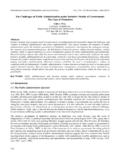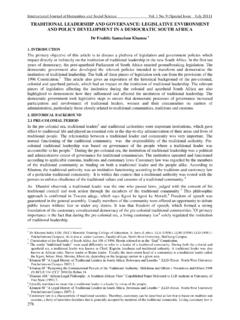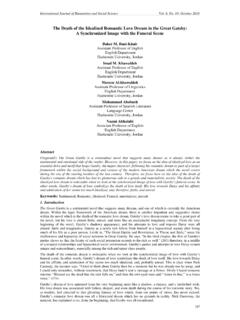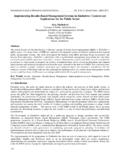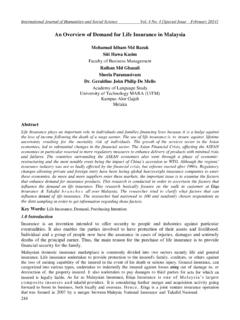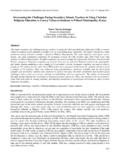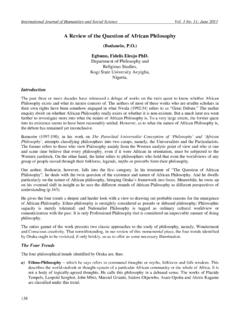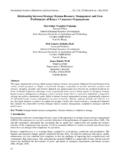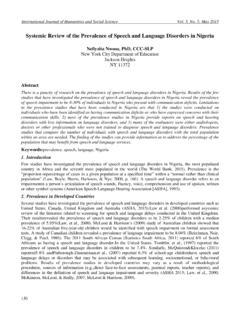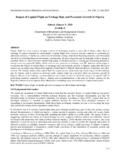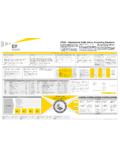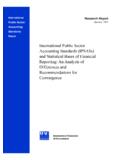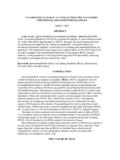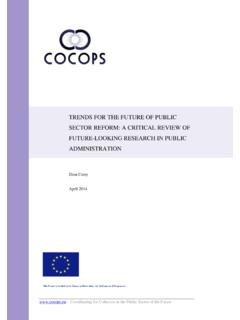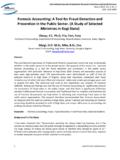Transcription of Efficiency and Effectiveness in Public Sector …
1 international Journal of Humanities and Social Science Vol. 3 No. 7; April 2013 267 Efficiency and Effectiveness in Public Sector auditing : An Evaluation of the Comptroller and Auditor General s Performance in Zimbabwe from 1999 to 2012 Mr. Tawanda Zinyama University of Zimbabwe Department of Political and Administrative Studies MP 167, Mount Pleasant, Zimbabwe Abstract The study examines the Government auditing in Zimbabwe in particular the performance of the Comptroller and Auditor General. The study argues that the legislative framework has a bearing on the Efficiency and Effectiveness of the Comptroller and Auditor General s performance. Within this context, the study sought to achieve the following objectives: firstly, critical analysis of the relevant legislative framework and its bearing on the auditing of government accounts and secondly, identification and analysis of the causes and effects of inefficiencies and ineffectiveness of the Comptroller and Auditor General.
2 The study revealed that the legislative framework has numerous loopholes. The Constitution of Zimbabwe; and the Public Finance Management Act Chapter 22:19 and Audit Office Act Chapter 22:18 that repealed the Audit and Exchequer Act Chapter 22:18 do not give the CAG s Office any sanction powers to compel Ministers, departments and other Public agencies to observe and comply with the Treasury instructions. The following factors influence the independence of the CAG in Zimbabwe: appointment procedures, removal procedures, nature of tenure, financial autonomy and the ability to employ staff. In addition, the study notes that the current state of audits and reports is unsatisfactory. The CAG s Office could not produce annual reports for tabling during the period 2000 and 2007.
3 The study revealed the following challenges being encountered by the CAG s office: gaps in the enabling legal instruments, unattractive remuneration, lack of sanction powers and budgetary constraints. The study s recommendations include changes in the appointment procedures of the CAG, amendment of the enabling legislation, improvement of the staffing and remuneration system which would enforce independence of the CAG. Key words: Comptroller and Auditor-General, Efficiency , Effectiveness , legislation Background of the Office of the Comptroller and Auditor-General in Zimbabwe The Office of the CAG of Zimbabwe traces its origin to the institutions established in the colonial era. The Southern Rhodesia Order in Council of 1898 stated Provision shall be made for full and sufficient audit once every year of the British South African Company relating to all sums received and all moneys expended (Government of Southern Rhodesia 1898:IX).
4 The order also stated that the CAG s audit must cover the following: The Consolidated Fund and the National Loans Funds; The Appropriation Accounts; Accounts of receipts to be paid into the Consolidated Revenue Fund and the accounts of the collecting departments; Internal accounts; and Operating accounts. Section 3 Accounts : These are accounts audited under the Audit and Exchequer Act of 1898 section 3. They included the accounts of the government officials maintained outside the Consolidated Fund/Loans Fund system, for example, the Paymaster General s accounts at the Reserve Bank of Rhodesia (Southern Rhodesia Order in Council 1898; Part III, sections 2-6). The Southern Rhodesia Order in Council of 1898 gave the CAG a statutory right of access to the financial records of departments and to other departments relating to accounts.
5 The scope of the CAG audit included the following: Centre for Promoting Ideas, USA 268 Financial and Regulatory Audit A financial audit to ensure that systems of accounting and financial control are efficient and operating properly and those financial transactions have been correctly authorized and accounted for. A regulatory audit which verifies that expenditure has been incurred on approved services and in accordance with statutory and other regulations and authorities governing them. Value for Money Audit An examination of economy and Efficiency , to bring to light examples of wasteful, extravagant or unrewarding expenditure, failure to maximize receipts or financial arrangements detrimental to the Exchequer and weakness leading to them Effectiveness Audit An examination to assess whether programmes or projects undertaken to meet established policy goals or objectives have met those aim (Command Paper; 7845(1903; 7).)
6 The Southern Rhodesia Order in Council of 1915 provided for the appointment of an Auditor General with independent powers to examine all administrative revenue and expenditure and with authority to disallow payments made without proper authority except the Exchequer Account (http; ). The powers of the CAG include the following: To have free access, at reasonable times, to records, books, vouchers, Public moneys or state property; Search and extract information from any book, document or record in custody of a government officer; Examine, under oath, any person regarding the receipt/expenditure of Public moneys, receipt/issue of any state property or other matters; Lay before the Attorney General a written case as to any questions, which require a legal opinion and raise a surcharge against the state employees or former state employees.
7 In 1924, with the granting of self-governing status, the Audit and Exchequer Act provided an audit function. The Audit and Exchequer Act of 1967, and subsequent amendments, sets forth the requirements for the current office of the Comptroller and Audit General. Organisation and staff of the CAG The policy and overall operations of the Audit Office were vested in the Policy Committee of the CAG, two Deputy Auditors General and Deputy Manager Parastatals (http; ). The Policy Committee carried its work through 16 sections: 11 conducted financial audits and 3 conducted value for money audits ( ). In addition, the Information and Technology Section manages the Computerisation of the office (ibid) and audits the computer systems in other government departments, and the training section coordinates and conducts in-house training.
8 The Office of the Comptroller and Auditor General recruited the staff from the Public Service, University of Rhodesia and only whites were recruited ( ). The Office emphasised the need to obtain professional qualifications and some financial assistance were available for this purpose. Refresher courses, seminars and external courses were offered to ensure that experienced staff were kept up-to-date. Performance of the CAG Though the CAG was effective and efficient in discharging its constitutional mandates, it had no teeth to bite (Kavran Report 1989). It could only identify the irregularities, misappropriation of Public funds and the abuse of Public property but it could not take any action. The Kavran Report (1989; 118) points out that During the Unilateral Declaration of Independence (UDI), the CAG was largely toothless.
9 It further notes that the financial audits were never carried out between 1971 and 1979 (ibid). The reasons for this state of affairs were that, the UDI Government was concentrating on the war. It was also fighting the economic sanctions. The Kavran Report (1989; 119) states also that during the UDI era the Comptroller and Auditor General never audited the expenditure of resources used to bust sanctions . international Journal of Humanities and Social Science Vol. 3 No. 7; April 2013 269 However, the CAG worked closely with the Treasury and the Public Accounts Committee. The Permanent Secretaries were required to inform the Public Accounts Committee of unauthorised or irregular expenditure but literature consulted indicated that this rarely happened during the Unilateral Declaration of Independence.
10 The CAG could note that expenditure exceeded appropriations approved by the Parliament but the Accounting Officers could disclaim responsibility for such actions, blaming ministers. The CAG could not do anything rendering the Office ineffective. During the UDI the audit coverage was unsatisfactory (Kavran Report, 1989; 167). From 1980, the CAG has repeatedly complained about unsatisfactorily state of affairs in Government Ministries. The Kavran Report states that most of the difficulties experienced by Accounting Officers in the areas of financial administration result from a lack of competent and effective budgetary control. An inability to monitor and control changes to financial plans result in unauthorised or excess expenditure.
